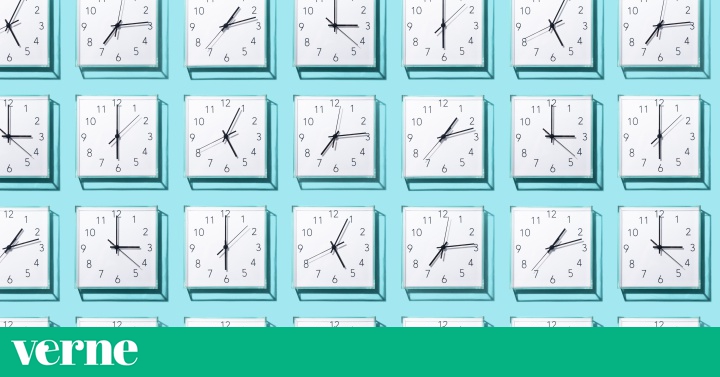It is time to advance the clocks again: at two in the morning on Sunday 29 it will be three. The fact that this spring's time change coincides with the confinement due to the coronavirus has caused some ironies: what use is this advance if we don't even know what day of the week we are on?
how everyday feels pic.twitter.com/elJephfeI5
- Z (@zahraloum) March 24, 2020It is no longer Monday, Tuesday or Wednesday, only morning, afternoon and night.
- Angelo 🦄 (@Angelo_uf) March 25, 2020now every day is the same and the weekend no longer makes sense https://t.co/NCxdw2VMwF
- Boris (@borissaw) March 21, 2020During these days we are staying at home to try to stop coronavirus infections. And there are many who have the feeling that it is difficult for them to know what day we are in, especially when they telecommute. Miguel Ángel Carrasco, director of the UNED Applied Psychology Service, explains that "more than confinement, what alters our perception of time is the breakdown of routine", which helps us organize our subjective perception of time.
For example, from Monday to Friday we left home to go to work, but also on Tuesdays and Thursdays we went to the gym, on Fridays we stayed with friends and on Sunday we played family food. These activities helped us to mark the passage of time. On the other hand, during these weeks there are fewer differences between one day and another, not only because there may be fewer activities, but also because many take place in the same space, spending almost all of our time at home.
Carrasco recommends having a routine, which does not necessarily have to be the same as we had before confinement. Even if we don't go to the gym, we can practice exercising at home; Even if we don't read every morning on the bus, we can reserve time each day for reading, and even if we don't hang out with our friends, we can spend time talking to them.
The health specialist psychologist Enric Valls agrees, adding that routines are "fundamental to our well-being". Both Valls and Carrasco underline the importance of differentiating working times and spaces from leisure. Especially on weekends, says Carrasco, when it is recommended that there be some "turning point" and we spend time on things that we do not do on weekdays.
For example, Valls recommends activities that allow this differentiation and that help us “adapt to this new situation”, such as watching a movie with the family. It is also a good idea to take off your pajamas during our free time, just as we do (or should do) to telework.
Routines not only help disconnect when we need it, as our perception of time is more in line with reality. They also "contribute to our emotional balance," says Carrasco. They are especially important in the case of children. "Disorganization is the main engine of imbalance in children," explains the psychologist, who misalignments can cause irritability and discomfort. Carrasco recommends that they know what are the hours to eat, play, study, sleep ...
The passage of time and memory
When we have a good time, we get the impression that time goes by faster. Also when we are busy or motivated and when we do new things. But it seems to go much slower when we are bored, when we are in pain or discomfort, and when we feel in danger. It can happen these days, when we may be bored or, worse, anxious or worried.
But we not only live time, we also remember it. When we are bored, the hours can be long, but we will remember them much shorter, since there will be nothing to evoke. Instead, we remember better the times when we do new things or when there is a greater emotional component, as journalist Claudia Hammond writes in her popular book Time Warped ("Deformed time").
When we do new or different things, "we create more new memories than in a normal day" and, although it seems to us that time passes faster, we will also end up with the impression that this time was longer. We have an example in what the author calls “the vacation paradox”: when we go on vacation, time seems to fly by, but when we return we remember them longer as there are more things to remember.
That is why it is important to maintain routines: doing things and occupying our time (reading, calling family, exercising ...) not only allows us to give structure to our time, but also helps us to give meaning to what we do . And breaking those routines from time to time, like on weekends, helps us introduce novelty, something useful at a time when it can be difficult to do. All this without prejudice that we also need to spend time doing nothing during these days. Let's keep this in mind when we are no longer obliged to spend our days at home: we often over criticize the poor routine and forget that we owe part of our mental health.
Carrasco also points out that when this is over we may realize that confinement has not only affected our perception of time. Overcoming all distances, the psychologist remembers what happens to prisoners: he changes his perception of space and distances. When we go out regularly, especially if we live in more or less small flats, streets and avenues such as Madrid's Gran Vía or Barcelona's Diagonal, they will seem enormous.
Do we focus on the here and now or do we plan for the future?
Having a marked routine that helps us differentiate between a Tuesday and a Saturday is not the only thing that will contribute to a positive state of mind during these days. Psychologists remember the importance of physical exercise and of avoiding alarmism and negative thoughts caused by current uncertainty.
Miguel Ángel Carrasco, director of the Applied Psychology Services of the UNED, explains that this confinement "requires certain adjustments", not only of routines, but also emotional ones. This can be done, for example, by focusing on the here and now, and thinking about what we have to do at each moment, as well as avoiding over-information.
Carrasco points out that making "realistic and tight" plans for the future (such as going to dinner at our favorite restaurant when this is over) can also help improve our mood. These plans can create "positive expectations and hope", as long as we don't end up focusing more on what we can't do right now than what we can do.
Enric Valls, a psychologist specializing in health, also talks about the importance of keeping busy and of social communication: talking to friends and family by phone or Skype, and even, from the balconies, with the neighbors. "This communication is going to protect us mentally" and all of these precautions will work as "protective factors" for our mental well-being.
To know more...
... Questions and answers about the coronavirus: from its symptoms to its possible social and economic effects.
... In this guide to action against coronavirus you can find answers to know what to do when you suspect it, how to prevent it or how to act if you are infected.
... Here you can follow the virus progression in Spain updated and here, in the world.
... We offer you ideas to better spend your time at home: exercise, music, culture without leaving the room.
... How to deal with isolation at home if you have anxiety problems.
... Do you get many jokes and memes about the coronavirus? What is humor for in a moment like this?
... Ideas and projects that seek to stop the curve.
... You can follow the latest news about the coronavirus in the live of EL PAÍS.
* You can also follow us on Instagram and Flipboard. Don't miss the best of Verne!









